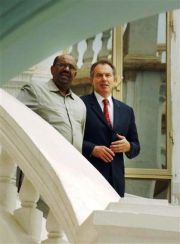Sudan accepts mutual pullout in Darfur – Blair
By MOHAMED OSMAN, Associated Press Writer
KHARTOUM, Oct 6, 2004 (AP) — Sudan has agreed to a joint withdrawal of government and rebel forces in Darfur and will accept a big increase in international cease-fire monitors, British Prime Minister Tony Blair said Wednesday after talks with the country’s president.

|
|
Prime Minister Tony Blair meets with the Sudanese President President Omar el-Bashir at the palace in Khartoum Sudan Wednesday Oct. 6, 2004. (AP) |
Blair said Sudan also committed to identifying the location of its troops and weapons in Darfur and working toward comprehensive peace agreements with rebels in Darfur and in southern Sudan by the end of the year.
More than 50,000 people have been killed in Darfur and another 1.4 million have been driven from their homes since February 2003. Originally a clash between African farmers and Arab nomads, the conflict has been inflamed by a counter-insurgency in which pro-government Arab militia have raped, killed and burned the villages of their enemy.
The government denies frequent allegations that it supports the Arab militia, known as the Janjaweed.
Blair, on the first stop of a three-day visit to Africa, said President Omar el-Bashir had agreed to all of the suggestions he gave him.
They included a significant expansion of African Union forces in Darfur, where a few hundred AU soldiers have been monitoring a shaky cease-fire among two rebel groups, government troops and allied militia.
“We need several thousand people there in order to monitor any cease-fire,” Blair told reporters at the British ambassador’s residence in Khartoum.
Others called for the government to identify the location of its troops and munitions in Darfur, return its troops to barracks in conjunction with a similar withdrawal by rebel forces, commit itself to reaching a comprehensive peace agreement with the rebels in Darfur and in southern Sudan by Dec. 31, and abide by the humanitarian accords signed with the United Nations on Darfur.
Blair said Britain would look to see that the government implemented all the pledges.
International Development Secretary Hilary Benn, who is traveling with Blair, said Britain would also try to push the two rebel groups back to the negotiating table. Peace talks in Nigeria last month collapsed.
“There is also a message for the Justice and Equality Movement and the Sudanese Liberation Army,” Benn told British Broadcasting Corp. radio. “They too have to be part of the solution, and they must enter negotiations in good faith with the government of Sudan because it is only a political agreement that, in the end, will bring this to a halt.”
The Sudanese Foreign Ministry later issued a statement saying Sudan was committed to “the leadership role and engagement of the African Union in addressing the situation in Darfur.”
The Foreign Ministry said Blair and el-Bashir also discussed the “finalization” of the peace process in southern Sudan.
There, the government and the Sudan People’s Liberation Army are in the final stages of sealing the peace to a war that began in 1983. They have agreed on how to share power and natural wealth, and to allow a referendum on succession for the south after a six-year transitional period.
Reporters asked Blair about his health, as he had an operation last week to correct an irregular heart beat. The temperature in Khartoum on Wednesday was over 40 degrees Celsius and humidity was high.
Blair replied humorously. “I think you can all see here I am addressing you yet again, and there’s nothing I find more conducive to quick recuperation and recovery than engagement with the British media,” the Press Association quoted him as saying.
Blair later flew to Addis Ababa, the Ethiopian capital, where he was met at the airport by Prime Minister Meles Zenawi.
He was expected to chair the second meeting of his Africa commission, which aims to report early next year before Britain’s presidency of the Group of Eight industrialized nations.
On Thursday, Blair was scheduled to make a keynote address, appealing for the international community to help tackle Africa’s problems. Blair has called Africa’s poverty and AIDS crisis “a scar on the conscience of the world,” and has pledged to make tackling the continent’s problems a focal point of Britain’s G8 presidency.
